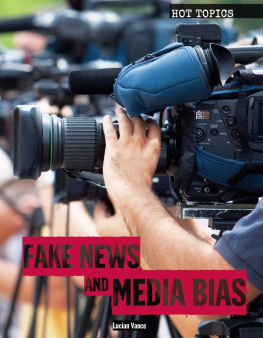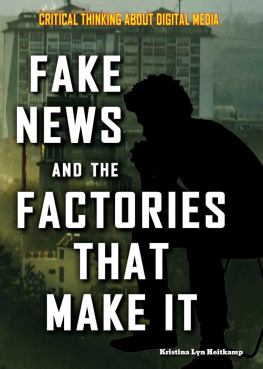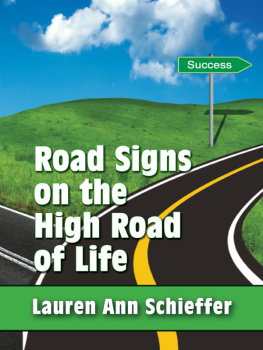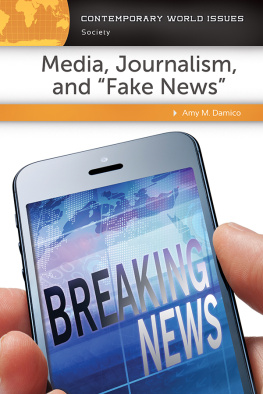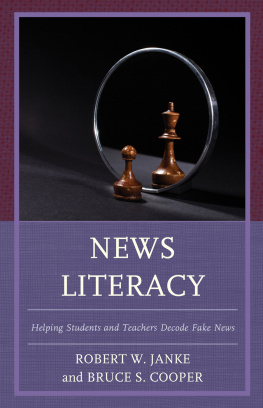Acknowledgments
I ALWAYS THOUGHT the best part of journalism is what you learned from those you interviewed, and after all my time as a reporter, as we put this book together, I learned things I never knew about the craft Ive been practicing all my adult life.
As we plunged into the interviews and podcasts that make up the core of the reporting for this book, I knew journalism was changing, I just didnt understand how much. I knew newspapers were in trouble, I just didnt comprehend how serious the problems really were. And I had little knowledge of what was happening on the web and just how mindboggling the changes were in how we get our information. For helping me understand what was happening on the web, I thank my friend Andrew Schwartz of CSIS. He knows as much about the new communications landscape as anyone I know, as the three chapters he wrote will attest. He was a wonderful teacher.
A big thanks as well to Lucy Boyd, whose chapter on fake news is one of the most important parts of this book, and to Kristie Bunton, who reminds us that it is more important than ever to ensure that young journalists have the proper training before they take their first jobs.
Andrew and I especially want to thank John Hamre, who runs the Center for Strategic & International Studies and whose idea it was to explore how people get their news and the impact that is having on not only journalism but also all aspects of American life from our culture to our national defense. He is truly one of Washingtons wise men.
Nicole Sganga of CBS News provided invaluable help to me in organizing the chapters and production of the manuscripts.
Thanks also to the CSIS team of Brandon Schwartz, Colm Quinn, Fran Burkham, Rebecka Shirazi, Ian Gottesman, Caroline Amenabar, Sofie Kodner, and CSIS interns Margaret Carlson, Brad Hoiberg, and Jamie Albaum, who helped with the research and production of our podcasts.
Andrew sends special thanks as well to CSIS executive vice president Craig Cohen for his friendship, expert advice, and always sound judgment. And a big thanks to Apples Steve Wilson for his stellar podcast guidance.
Writing this book gave me a new appreciation for those who cover the media beats, so a shout-out as well to David Bauder of the Associated Press, Margaret Sullivan and Paul Farhe at the Washington Post, Jim Rutenberg and Michael Grynbaum of the New York Times, Brian Stelter of CNN, Hal Bodeker of the Orlando Sentinel, David Zurawik of the Baltimore Sun and Howard Kurtz of Fox News. Journalism is the most publically self-correcting of all our institutions and covering the media used to be the job no reporter wanted, but it has become one of the most important parts of journalism.
Finally, thanks to my longtime partner on Face the Nation, executive producer Mary Hager. I couldnt be more proud of what she and John Dickerson are doing with the broadcast. She still finds time to give me good advice.
Afterword
TOM BROKAW AND I have been close friends since our days of covering the Ford White House together, and I first heard this story from him about his friend Pete Dawkins, the All-American football star at West Point and later the armys youngest brigadier general.
Dawkins had been assigned to a team tasked with writing a new set of regulations for defining a proper military haircut.
After extensive deliberation on how to explain a military haircut, Dawkins said, Why dont we just draw a picture? They did and went on to lesser challenges like war-fighting strategies.
Ive devoted many words in this book hoping to define the role of journalists in a democracy. But maybe Dawkins had a better idea. Rather than trying to define good journalism, just present an example. There was no finer example in 2016 than the work of David Fahrenthold of the Washington Post, who got the dreary assignment of investigating Donald J. Trumps often cited charitable activities, a project that may have told us more about Trump than any other single investigation. And there is a bonus, in December of last year Fahrenthold wrote an account of how he did it, including how he called three hundred separate charities.
I have always loved art and am an aspiring painter, and in early years when I was struggling to find a style, a wise teacher told me: Just pick out an artist you like and copy him. You come to understand how he solved the problems youre struggling with and your own style will grow out of that in time.
In that spirit and with thanks to Washington Post editor Martin Baron for allowing us to reprint it, what follows is Fahrentholds story of how he did it. To young reporters I say only this: Just copy what he did and youll be fine!
By David Fahrenthold
Arnold and Tim, if youd come up, were going to give you a nice, beautiful check, Donald Trump said. He held up an oversize check, the kind they give to people who win golf tournaments. It was for $100,000. In the top-left corner the check said: The Donald J. Trump Foundation.
Along the bottom, it had the slogan of Trumps presidential campaign: Make America Great Again.
This was in February.
The beginning of it.
Trump was in Waterloo, Iowa, for a caucus-day rally at the Five Sullivan Brothers Convention Centernamed for five local siblings who had been assigned to the same Navy cruiser in World War II. They all died when the ship went down at Guadalcanal.
Trump had stopped his rally to do something presidential candidates dont normally do. He was giving away money.
Arnold and Tim, whom he had called to the stage, were from a local veterans group. Although their big check had Trumps name on it, it wasnt actually Trumps money. Instead, the cash had been raised from other donors a few days earlier, at a televised fundraiser that Trump had held while he skipped a GOP debate because of a feud with Fox News.
Trump said he had raised $6 million that night, including a $1 million gift from his own pocket. Now Trump was giving it, a little at a time, to charities in the towns where he held campaign events.
See you in the White House, one of the men said to Trump, leaving the stage with this check that married a nonprofits name and a campaigns slogan.
He said, Well see you in the White House, Trump repeated to the crowd. Thats nice.
After that, Trump lost Iowa.
He won New Hampshire.
Then he stopped giving away money.
But as far as I could tell, just over $1.1 million had been given away. Far less than what Trump said he raised. And there was no sign of the $1 million Trump had promised from his own pocket.
So what happened to the rest of the money?
It sounded like an easy question that the Trump campaign could answer quickly. I thought Id be through with the story in a day or two.
I was wrong.
That was the start of nine months of work for me, trying to dig up the truth about a part of Trumps life that he wanted to keep secret. I didnt understandand I dont think Trump understood, eitherwhere that one check, and that one question, would lead.
Ive been a reporter for the Washington Post since 2000, covering everything from homicide scenes in the District to Congress to the World Championship Muskrat Skinning Contest. (People race to see who skins a dead muskrat the fastest. Theres also a beauty pageant. Some women compete in both.)
By the time I got to that Trump event in Waterloo, Id been covering the 2016 presidential election for thirteen months, since the last weeks of 2014. But I had the track record of a mummys curse: Just about every campaign I had touched was dead.
I had, for instance, covered former New York governor George Patakis (failed) attempt to get people to recognize him in a New Hampshire Chipotle. Pataki dropped out. I read the collected works of former Arkansas governor Mike Huckabee and made a list of everything the old Baptist preacher had ever condemned as immoral or untoward. The subjects of his condemnation ranged from college-age women going braless to dogs wearing clothes to Beyonc. Huckabee condemned me. Then he dropped out, too.


